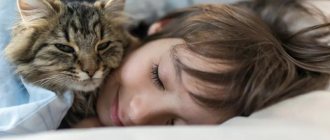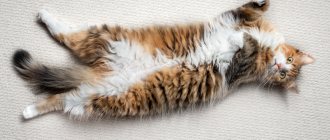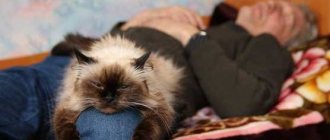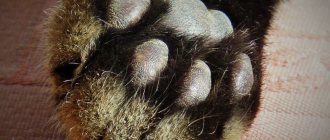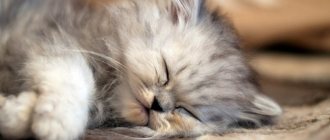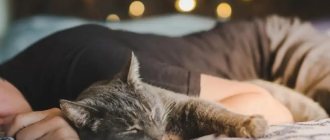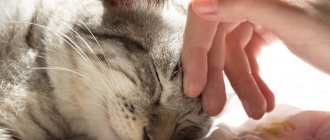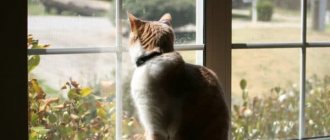All owners of furry pets are well aware that adult cats are real sleep gurus. They can sleep anywhere, in any position and at any time, just look at funny photographs of animals sleeping in the most unexpected places. An adult cat sleeps on average about 13 - 16 hours a day, this is usually enough for him to replenish his strength and restore, and out of boredom he can doze off for some time, which is observed in the summer, when animals become lazy and sedentary from the heat who prefer wallowing in the cold to active games. Why a cat sleeps longer than 2/3 of the day needs to be understood. There are both completely harmless causes of cat sleep disturbance, and formidable pathologies that threaten the health and even the life of a pet.
If a cat sleeps all the time, is this normal or pathological?
Long-term sleep is inherent in cat genes and is the result of evolution - domestic cats do not need to hunt in order to get food, as well as to conquer territory. An adult animal can sleep up to 20 hours a day, that is, the time between meals. This occurs in situations where the cat is alone at home all day or no one pays attention to it. The first answer to the question of why cats sleep a lot is boredom - caressed and fed pets have nothing else to do.
Cats do not always sleep soundly; most of the time they are in a state of drowsiness, which is characterized by a completely relaxed posture and closed eyes, but at the same time a readiness to wake up at any moment. This is indicated by:
- twitching ears;
- purring;
- reaction to the slightest noise;
- periodic stretching and other body movements.
A cat's deep sleep is characterized by tightly closed eyes, a curled up body, a tail on its face, and even light snoring. The twitching of a cat's whiskers and paws in a dream indicates that he is having dreams - all pets have the ability to see them.
Caring owners are well aware of all the habits of their pets, including the duration and characteristics of their sleep. Any change in habits can be pathological.
Sleep Features
Cats spend almost two-thirds of the day sleeping, but any deviation in the direction of a significant decrease or increase in hours of sleep should force the owner to take a closer look at the pet. Little kittens can generally sleep almost all the time, interrupting only for food and a short exploration of the world around them. Adults become more active, mobile and spend periods of wakefulness longer and more interesting.
Several factors can influence sleep duration:
- seasonality and weather conditions, in hot weather cats become sleepier,
- age, small kittens and older individuals sleep more,
- how full the pet is, the feeling of satiety always makes you sleepy,
- the atmosphere of the house, the calmer and more comfortable, the more serene the pet rests,
- activity and health.
It is worth noting that overfed cats can sleep more than normal and be less active and mobile than their “slender” counterparts.
© shutterstock
Cats cannot sleep continuously. He goes through phases, the first of which is dozing. At this time, processes slow down, but the cat can return from dormancy to wakefulness instantly. If nothing interferes, he falls into a deep sleep. And then complete relaxation sets in, during which it is quite difficult to wake up the pet.
These two phases constantly alternate. At the same time, you still need to leave time for games, entertainment and, of course, delicious food.
Constant sleep - is it normal or a deviation?
The duration of sleep directly depends on the conditions in which the cat lives. Street animals sleep much less than domestic animals, and all because they need to make an effort to feed themselves - hunt mice, look for food and even take it from their fellow animals. They more than make up for the energy expended on hunting and street fighting during long sleep, amounting to about 13–15 hours a day.
Pets, especially those that do not go outside, live on everything ready-made. They do not need to get their own food, protect their territory and take care of their offspring. Out of boredom and idleness, they can sleep 20 or more hours a day, and this will be considered their norm. We can talk about a deviation in situations where the animal’s long sleep is accompanied by lethargy, apathy, refusal to eat and other similar symptoms that require immediate contact with a veterinarian.
We figured out why cats sleep for a long time - from boredom, idleness, cloudy weather, and also to save energy. The length of time a pet sleeps is directly affected by its breed, temperament, age and living conditions. Sleep may lengthen for several reasons:
- severe fatigue;
- stress;
- the weather is too hot or, conversely, too cold;
- vaccination or surgery;
- castration or sterilization;
- pregnancy.
Older cats sleep much more than younger ones, this is due to the aging of its organs and systems and the slowdown of metabolic processes in the body. Be sure to pay attention to the duration of sleep; its increase may be the first symptom of the disease.
The origin of the cat's long sleep
Cats are originally nocturnal animals. This is how their distant ancestors were, and this is how modern mustachios-striped animals remain. This quality is especially familiar to residents of rural areas, private houses and summer cottages. Living in complete or partial freedom, cats come home only to eat and sleep, preferring to travel or hunt at night.
Domestic cats, who live indoors all their lives, rarely roam around the apartment at night, so they sleep much more than their more free-spirited counterparts. For them, significant daytime sleep is simply necessary, as the body needs to recover and digest the prey. How domestic fluffies sleep so much and maintain the flexibility of the spine and joints, the elasticity of muscles with little physical activity is a mystery that has not yet been solved by scientists.
Long sleep as a sign of illness
If you are concerned about why your cat is constantly sleeping, since this has not been observed before, this is a good reason to contact a veterinarian, who, after examining the animal, will be able to identify a developing pathology. An increased duration of sleep indicates a disease in a cat if it is accompanied by other symptoms:
- increased body temperature;
- lethargy and apathy;
- nausea and vomiting;
- hoarse breathing and runny nose;
- matted wool;
- causeless meowing and aggression.
The above symptoms observed in a domestic cat or cat may indicate food poisoning, surges in blood pressure, viral and bacterial infections, helminthiasis, hypovitaminosis, the appearance of fleas and other parasites. We cannot discount anemia, which can develop due to poor nutrition or internal bleeding, endocrine disorders, diseases of the musculoskeletal system, and even oncology. A veterinarian will be able to make an accurate diagnosis after receiving test results and examination.
Possible diseases and their symptoms
Long sleep can also indicate illnesses of your beloved pet. You should conduct a thorough examination and observe the cat for some time. For what? To understand whether this is serious or everything is normal. The following symptoms may indicate the presence of pathologies.
- Vomiting and diarrhea.
- Decreased appetite.
- Dry and hot nose.
- Inflammation of the eyes or mouth.
- Labored breathing.
- The presence of mucus or blood in the discharge.
- Hair loss or itching.
- Refusal of water or thirst.
- Weight. Those pets who are overweight have difficulty moving around and leading an active lifestyle. That's why they sleep and eat more. But if you leave it just like that, the animal may develop other diseases against the background of obesity. We must fight excess weight.
The presence of infections or allergies, as well as diseases of the cardiovascular, digestive and excretory systems, forces the cat to spend more time sleeping. Various stresses and unfavorable surroundings can provoke these diseases.
As soon as you notice that your cat has restless sleep, is apathetic, and has lost his appetite, you should be wary. Having determined the exact symptoms, you should take your pet to the doctor to identify the source of the disease and what influenced the environment of such sleep.
The cat will definitely show you that he feels bad. In any case, you will notice this by his behavior.
Constant sleep after spaying and neutering
Sterilization and castration, which pet owners often resort to, is another reason why cats sleep all the time, both during the day and at night. Both sterilization and castration are serious interventions in the functioning of the organs and systems of the animal’s body. After the operation, the cat experiences serious stress; this condition requires full recovery, which the animal can receive in a dream. Hormonal changes in the body of a pet after sterilization or castration cannot be discounted. The cat or cat will be lethargic, drowsy and apathetic until the restructuring of hormones is completed and their body begins to function as before.
What dreams do cats have?
Cats dream - this is a scientifically proven fact. What do our favorite purrs dream about? French neurophysiologists from the University of Lyon were looking for an answer to this question. Their findings authoritatively confirmed what one could have simply guessed: in their dreams, cats live some kind of parallel lives that differ little from reality.
In dreams, cats live parallel lives.
They hunt and simply eat, chase prey and run away from pursuit, fight with enemies and caress their cubs. According to scientists, there are still more positive things in cat dreams than unpleasant moments. But here’s what’s curious: neither cats nor cats ever dream of erotic scenes. Scientists have not yet found an explanation for this.
How to change your indoor cat's sleep pattern?
The sleep schedule of a domestic cat or cat needs to be changed in situations where the animal sleeps during the day and is awake at night, preventing other family members from resting. This behavior does not lead to anything good - the owners feel irritated and take out their anger on the pet, which, in turn, begins to take revenge - the problem worsens even more.
The normal sleep pattern of a domestic cat can be restored by moderate activity during the day, the attention of the owners and dense food in the evening, as well as a minimum of reasons for alarming the animal and the complete elimination of stress.
Domestic cats sleep long and sweetly, which is a variant of the norm. But if long and restless sleep is accompanied by lethargy, refusal to eat and other dangerous symptoms, do not delay a visit to the veterinarian - early treatment can prevent the development of a serious disease that threatens the health and life of your pet.
See also: a cat sleeps at the owner’s feet - reasons
Cat sleep: how long does it last?
The duration of sleep depends on many factors. This includes age, room temperature, sense of security, activity, and weight of the pet. Cats sleep for long periods of time, spending more than half their lives simply snoring, but unlike humans, cat sleep is rarely deep.
How does a cat sleep? For many, this still remains a mystery, but research allows us to lift the veil of secrecy. An animal's sleep can be divided into several cycles and phases:
- Preparation - choose a warm place, preferably elevated above the floor, soft and comfortable. The cat stomps to check whether it is safe to lie here, and also to create a depression. He stretches, relaxes and lays down;
- Napping - the cat sleeps calmly, does not make sounds, most often lies in a ball or on its stomach. Breathing slows down at this time, the heart beats slower, but the pet is very sensitive. If you touch him, he will wake up immediately. This phase lasts no more than half an hour;
- Deep sleep - occurs after a nap if the cat is not bothered by anything. Muscle tone is completely absent, the eyelids begin to twitch, convulsions, cramps, twitching of the paws and whiskers may appear. Your pet dreams: hunting, attacks, treats, which leads to growling, turning from side to side, meowing. NREM sleep lasts about 20 minutes, and then it is replaced by drowsiness again;
- Waking – Depending on why the cat woke up, its awakening will vary. So, if the pet is awakened by appetizing smells or a slight feeling of hunger, the cat will be lethargic, stretch, and close its eyes. If the reason lies in sharp sounds and a sense of danger, the animal will quickly emerge even from the stage of deep sleep.
Seals rest a lot, their sleep is over 16 hours a day. Babies and older pets sleep the longest: young and active animals have much more worries and hobbies. During sleep, babies have to gain strength and grow better, so kittens rapidly gain weight and grow up very quickly.
However, even at home, the cat does not cease to be a predator and hunter. He sleeps extremely carefully, constantly wakes up, and as soon as you open the refrigerator or unwrap the rustling wrapper, his little ears will rise, and the pet will restlessly inspect the territory.
Kittens sleep
Cat babies are born blind and deaf. Eating and sleeping under mother’s warm belly are the only events and joys of their life. But in these little ones, the fast phase predominates and accounts for up to 70 percent - to put it simply, they dream, and sleeping kittens experience a lot of emotions.
Even newborn kittens dream.
Even just yesterday, kittens that were born are happy about something and are afraid of something in their dreams - they twitch their paws, squeak, even hiss, opening their toothless mouths.
Newborn kittens sleep almost 24 hours a day and are only awake when they eat. This is completely normal, because all children grow well in their sleep. But the kids have already grown up, and the world of their interests is expanding every day further and further beyond the “nest” in which they were born. Kittens play a lot and actively, receiving a lot of impressions every minute, and proper rest is vital for them.
All cats love to sleep with their owners - even the smallest ones.
In a dream, a kitten not only regains its strength, its brain works tirelessly - systematizes and analyzes the information received, puts all recent events “on the shelves.” As the baby grows up, it gradually enters an adult sleep pattern and by four to five months sleeps as much as its mother.
Changes in sleep depending on age
Experienced felinologists know that the duration of a cat's sleep varies depending on the age of the individual. The approximate duration of rest is as follows:
- Kittens up to three weeks sleep 22-23 hours, and wake up only to eat.
- Month-old babies have been resting for 20-21 hours, and spend the rest of the time exploring the world and playing their first games.
- Kittens from two months sleep for 18-20 hours.
- Adults are in the arms of Morpheus for 14 to 16 hours, which is considered the norm.
- Old animals sleep on average 22 hours, and wake up only to eat, go to the toilet and take a short walk or be close to the owner.
Sleep is an important component of a cat’s life, without which it will not be able to please its owners, frolic, run and hunt. A full, long rest, not accompanied by a lack of appetite and lethargy, is the key to health and longevity.
Energy building
Most cats—wild and domestic, big and small—are most active at night. They sleep during the day and hunt (or play pranks) at night. In fact, hunting requires a lot of energy - waiting, chasing, running and jumping.
Obviously, the average house cat doesn't hunt prey in the same way as their lion cousins. However, they do enjoy a good hunt, whether it's a catchy ball or your feet (fun fact: domestic cats and lions share 95.6% of the same DNA). However, the same hunting instincts are built into your cat, and therefore, she has the same need to sleep all day to conserve energy so that your cat can be entertained while you are trying to sleep.
Image Credit: Roy Buri, Pixabay
Cat depression
If excessive sleeping is accompanied by other signs such as loss of appetite, avoidance, and other unusual behavior, it may mean your cat is suffering from depression. However, feline depression is not the same as clinical depression in humans. This condition may present with symptoms similar to those mentioned as a result of an underlying medical condition. In such cases, it is best to take your cat to a veterinarian, who will perform the necessary tests to determine what is wrong with your cat.
Why do cats sleep so much?
Cats are predators, but they lack the herd instinct. The nature of representatives of the cat family is associated with the hunting instinct. Cats' prey - birds, rodents, some types of beetles - is most active at sunrise and sunset, which is why hunters are most active during these hours.
The animal, noticing its prey, creeps up to it and tries to catch it. If the attempt was successful, the prey is eaten, then the cats calmly fall asleep with a sense of accomplishment. Cats in most cases do the same - if at this time they are not burdened with caring for offspring or are not actively searching for a partner, they have no other worries.
Most modern cats live in complete comfort and do not need to get their own food or find a safe place to sleep. They have no other activities besides sleeping. The life schedule will mainly depend on the owners - if the house is empty most of the day, the animal will sleep at this time. Sometimes cats fall asleep simply out of boredom if there are no other animals in the house and all the owners have gone about their business.
Normal sleep duration for a kitten
Wild cats are predators that prefer to hunt prey at night. During the day they get enough sleep to regain strength. The sleep is sensitive, intermittent, the animal wakes up from the slightest rustle. Always on the alert. Pets do not have to get their own food; they live in favorable conditions, where they are fed to their fill, houses are built, and sleeping places are provided. They don’t need to hunt at night and be on “combat readiness” during the day, so they can afford to sleep longer – up to 18 hours a day. However, the life cycle features of wild and domesticated cats are similar. As for small cubs, their sleep duration is much longer than that of adult animals.
Is it possible to synchronize cat and human mode?
Cats are guided by instincts, so even if the cat is at home, hunting has not been canceled. And especially at night. That's why many owners complain about their pets that they don't let them sleep. But this state of affairs can still be corrected. Cats understand everything pretty quickly. But in fact, it seems as if they did not hear the order to go to bed at all. And other individuals may begin to take revenge for the fact that they are not allowed to hunt at night. You won’t be able to talk to a cat much like you would a person, but you can try to instill in it new everyday habits. Not every cat will appreciate such a turning point, but it will definitely be able to adapt. The main thing is to follow the rules and never miss the schedule.
Agreeing is not a problem. Maybe the cat can hear you!


